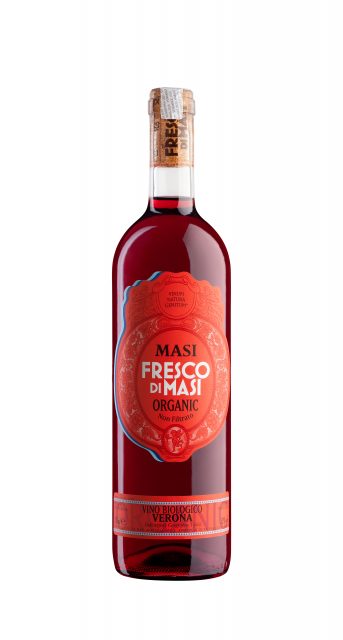This website uses cookies so that we can provide you with the best user experience possible. Cookie information is stored in your browser and performs functions such as recognising you when you return to our website and helping our team to understand which sections of the website you find most interesting and useful.
Valpolicella producer taps into demand for sustainable, fresh wines
Renown Valpolicella producer Masi Agricola is tapping into the demand for more sustainable, fresh wines with its new range of ‘uncomplicated’ organic wines.

Speaking to the drinks business, Raffaele Boscaini, head of the technical group and seventh generation of the family owners of Masi said the goal had been to produce wines that didn’t need any explanation, which would bring people who were “more interested in what was in their mouth than what was behind the label – the territory, the history, or the technique”.
Boscaini argued that over the last few years, and fuelled by the pandemic, people’s interest and values have changed with the result that they are actively looking for products that can be genuinely sustainable and “sincere”.
Boscaini argued that the best way to find authenticity in wine was to take a step back and strip the processes back – minimising man’s intervention on nature, to return to the origins.
“This was how we conceived the wine, by taking off things that are not necessary,” he explained. “Do we need wine that is capable of staying in the cellar for 20 year? Probably not. Do we need to have a wine stopper that’s clear and shiny? So let’s try without these thing, with the simplicity and purity of the crushed juice as soon as possible from the vine to the table, in the shortest road.”
“We have finally made farmhouse wine good,” he explained. “Properly done and clean” .
Red and white
The new Fresco di Masi range comprises a red blend, Fresco di Masi Rosso Verona igt, and a white Fresco di Masi Bianco Verona igt, which are each a blend of local and international varieties. The red blend contains around 70% Corvina (the grape that makes up Valpolicella’s famous wines and Amarone) from Zuane, in the commune of Rivoli Veronese, with 30% Merlot which Boscaini said gave structure to the classic cherry fruits.
“Appassemento doesn’t need that structure, but this wine does, not much but a bit,” he said.
He added that the red blend, was able express very fresh characteristics, which was more unusual in a red wine than a white. “The red is extraordinary and people say “Wow, this is really new!’,” he said.
The white blend comprises around 60% Garganega, 25% Chardonnay, 15% Pinot Grigio (proportions will vary according to the vintage) in order to give a bit more body in the mid-palate. Meanwhile the alcohol level is kept low to retain freshness and drinkability rather than going for complexity or a long lasting finish in the mouth.
The grapes come from organic vineyards located in Zuane, in the commune of Rivoli Veronese, a province of Verona, on the right bank of the Adige river. The basaltic soil has good structure and is full of schist and sand, and the vines benefit from fresh breezes that run through the Adige Valley, protecting them from moulds and mildews that are typical of wet environments. The vineyards are farmed organically, with minimum use of machinery, no pesticides or herbicides, and methods such as sexual confusion of pests and grassing over the vine rows, along with emergency drop irrigation.
The grapes are harvested at the coolest time of day and immediately vinified, with soft pressing of whole berries and hyperoxygenation of the must, before they wines are decanted naturally using gravity at cool temperatures and naturally fermentation with indigenous wild yeasts, before being matured for two months in stainless steel.
Upping production
The first vintage produced around 150,000 bottles of red and white wine, but the team are expecting to ramp up production to around 1 million bottles within the next three years, using a combination of estate grown grapes and grapes through its long-term suppliers. Around 55% of this will be red varieties and 45% white.
Boscaini said it is working with food, trends and lifestyle influencers on social media to raise awareness of the new line.
“The product does not need to be explained technically, but it’s more about the mood of the drinkers, more a lifestyle wine. You drink it and you understand it, you don’t need to know the variety of the grapes,” he said.
Feedback so far had been very good from both distributors and consumers, Boscaini added, notably in the Nordic monopoly and northern European markets, which have widely embraced “authenticity and sustainability” and where Masi Agricola has strong sales. It is also launching in Canada this autumn, and in the US next year.

